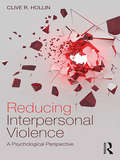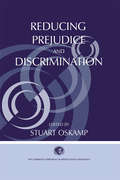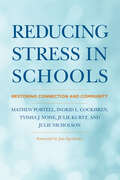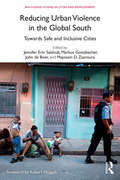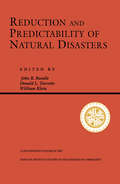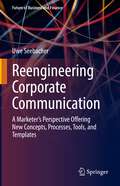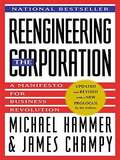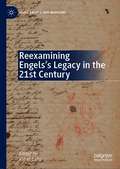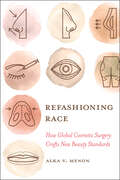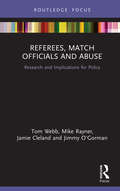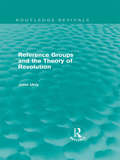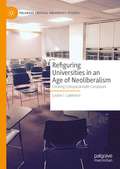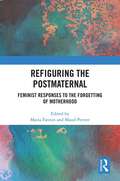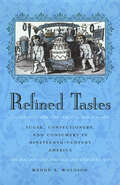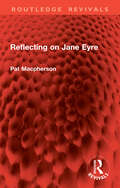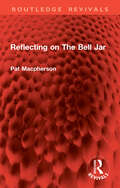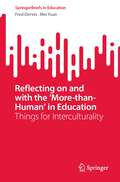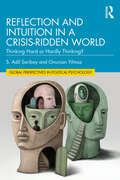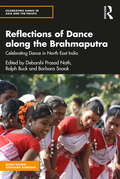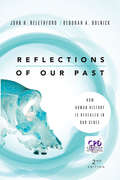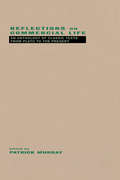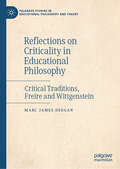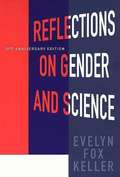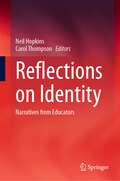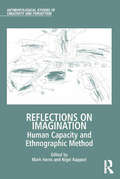- Table View
- List View
Reducing Interpersonal Violence: A Psychological Perspective
by Clive HollinThere are many types of interpersonal violence that can lead to short- and long-term physical and psychological effects on those involved. Reducing Interpersonal Violence reflects on the World Health Organization’s stance that interpersonal violence is a public health problem and considers what steps can realistically be taken towards its reduction. Clive Hollin examines interpersonal violence across a range of settings, from bullying at school and in the workplace, smacking children and partner violence in the home, to sexual and other forms of criminal violence in the community. This book summarises the research on evidence-based strategies to reduce violence and shows that reducing interpersonal violence can have a positive effect on people’s wellbeing and may save a great deal of public expenditure. This book is an invaluable resource for students and researchers in the fields of psychology, criminology, law, and police studies, as well as professionals such as probation staff and forensic psychologists.
Reducing Prejudice and Discrimination (Claremont Symposium on Applied Social Psychology Series)
by Stuart OskampFinding ways to reduce prejudice and discrimination is the central issue in attacking racism in our society. Yet this book is almost unique among scientific volumes in its focus on that goal. This important book combines critical analysis of theories about how to reduce prejudice and discrimination with cutting-edge empirical research conducted in real-world settings, as well as in controlled laboratory situations. This book's outstanding contributors focus on a common set of questions about ways to reduce intergroup conflict, prejudice, and stereotyping. They summarize their own research, as well as others, interpret the conclusions, and suggest implications concerning the practical methods that have been, or could be, used in programs aimed at reducing intergroup conflict. The chapters present solidly based critical analyses and research findings in clear, reader-friendly prose. This book evolved from the Sixteenth Annual Claremont Symposium on Applied Social Psychology. Each Symposium in the series concentrates on a single area in which social psychological knowledge is being applied to the resolution of a current social problem. Ideal for teachers, social workers, administrators, managers, and other social practitioners who are concerned about prejudice and discrimination, this book will also serve as a valuable foundation of knowledge in courses that examine this topic.
Reducing Stress in Schools: Restoring Connection and Community
by Mathew Portell Ingrid L Cockhren Tyisha J Noise Julie Kurtz Julie NicholsonEssential, accessible guidance for using trauma-informed practices to relieve student and educator stress in schools
Reducing Urban Violence in the Global South: Towards Safe and Inclusive Cities (Routledge Studies in Cities and Development)
by Jennifer Erin Salahub Markus Gottsbacher John De Boer Mayssam D. ZaarouraReducing Urban Violence in the Global South seeks to identify the drivers of urban violence in the cities of the Global South and how they relate to and interact with poverty and inequalities. Drawing on the findings of an ambitious 5-year, 15-project research programme supported by Canada’s International Development Research Centre and the UK’s Department for International Development, the book explores what works, and what doesn't, to prevent and reduce violence in urban centres. Cities in developing countries are often seen as key drivers of economic growth, but they are often also the sites of extreme violence, poverty, and inequality. The research in this book was developed and conducted by researchers from the Global South, who work and live in the countries studied; it challenges many of the assumptions from the Global North about how poverty, violence, and inequalities interact in urban spaces. In so doing, the book demonstrates that accepted understandings of the causes of and solutions to urban violence developed in the Global North should not be imported into the Global South without careful consideration of local dynamics and contexts. Reducing Urban Violence in the Global South concludes by considering the broader implications for policy and practice, offering recommendations for improving interventions to make cities safer and more inclusive. The fresh perspectives and insights offered by this book will be useful to scholars and students of development and urban violence, as well as to practitioners and policymakers working on urban violence reduction programmes.
Reduction And Predictability Of Natural Disasters
by John RundleWithin the past five years, the international community has recognized that it may be possible, through programs of systematic study, to devise means to reduce and mitigate the occurrence of a variety of devastating natural hazards. Among these disasters are earthquakes, volcanic eruptions, floods, and landslides. The importance of these studies is underscored by the fact that within fifty years, more than a third of the world’s population will live in seismically and volcanically active zones. The International Council of Scientific Unions, together with UNESCO and the World Bank, have therefore endorsed the 1990s as the International Decade of Natural Disaster Reduction (IDNDR), and are planning a variety of programs to address problems related to the predictability and mitigation of these disasters, particularly in third-world countries. Parallel programs have begun in a number of U.S. agencies.
Reengineering Corporate Communication: A Marketer’s Perspective Offering New Concepts, Processes, Tools, and Templates (Future of Business and Finance)
by Uwe SeebacherThis book employs the latest insights from modern marketing into the theory and practice of corporate communication, including the main stages and goals, and highlights the key potentials for the field. It briefly presents the essential features of the methodological and structural sciences in order to illustrate to the reader how, from a marketer's point of view, these new insights can be derived objectively, reliably, and validly for the field of corporate communication according to scientific criteria. The book then introduces the maturity model for modern corporate communication and describes which fields of activity must be gone through in order to be able to implement the change management process towards corporate communication excellence efficiently and effectively. Building on this, it introduces and defines the most important new concepts of corporate communication in the twenty-first century and thus clearly delineates the field of research for this corporate function in the coming years. The book goes on to address the important areas of IT and HR in order to provide a 360° view of the developments to be realized in the field of corporate communication. A “CC self-test” at the end of the book is intended to help the reader immediately recognize where their own organization stands and, against this backdrop, to be able to start the necessary activities towards corporate communication excellence immediately on the basis of the maturity model. “Prof. Dr. Uwe Seebacher takes us on a timely and informative read on what could be the biggest crisis for Corporate Communications – remaining stagnant in a time of great change. With rich context and fine detail, he illuminates the opportunities to reengineer Corporate Communications and quantify its role in truly impacting business. From the importance of predictive intelligence underpinned by authenticity and empathy to building trust, this book is a guide for successful business in the 21st Century. I highly recommend it.”Heidi Eusebio, Strategist and Executive Director, Edelman "Uwe Seebacher has once again demonstrated in a well-founded manner what methodological and structural science is capable of - namely, to precisely logically derive the long overdue process of change in the field of corporate communications and thereby make it comprehensible. But he also takes the important next step of operationalizing his thoughts in a directly measurable way by providing an easy applicable concrete process model for reengineering corporate communication with many tips, templates and inputs for HR and IT.“ Miguel Gimenez de Castro, Head Of Communications Spain, Portugal, Greece and Israel, IBM
Reengineering the Corporation: A Manifesto for Business Revolution
by Michael Hammer James ChampyThe most successful business book of the last decade, Reengineering the Corporation is the pioneering work on the most important topic in business today: achieving dramatic performance improvements.
Reexamining Engels’s Legacy in the 21st Century (Marx, Engels, and Marxisms)
by Kohei SaitoWhile the deepening structural crisis of capitalism in the 21st century has led to a revival of interest in Marx all over the world, Marx’s life-long comrade Frederick Engels has largely remained marginalized. To commemorate the bicentenary of Engels birth, this edited collection aims to rectify this gap in academic scholarship by gathering a diverse group of scholars to consider the legacy of Engels’s thought and work and critically examine his theoretical relevance in today’s world. The contributors of this volume provide new, stimulating reading of Engels’s works to revive some of Engels’s key ideas. The Legacy of Engels in the 21st Century integrates the most recent discoveries and achievements of Marxian scholarship, employing the historical-critical method developed in the Marx-Engels-Gesamtausgabe to shed light on the forgotten aspects of Engel's critique of capitalism and vision of postcapitalism.
Refashioning Race: How Global Cosmetic Surgery Crafts New Beauty Standards
by Alka Vaid MenonCosmetic surgery was once associated with a one-size-fits-all approach, modifying patients to conform to a single standard of beauty. As this surgery has become more accessible worldwide, changing beauty trends have led to a proliferation of beauty standards for members of different racial groups. Alka V. Menon enters the world of cosmetic surgeons, journeying from a sprawling convention center in Kyoto to boutique clinics in the multicultural countries of the United States and Malaysia. She shows how surgeons generate and apply knowledge using racial categories and how this process is affected by transnational clinical and economic exchanges. Surgeons not only measure and organize but also elaborate upon racial differences in a globalized field of medicine. Focusing on the role of cosmetic surgeons as gatekeepers and producers of desired appearances, Refashioning Race argues that cosmetic surgeons literally reshape race—both on patients' bodies and at the broader level of culture.
Referees, Match Officials and Abuse: Research and Implications for Policy (Routledge Focus on Sport, Culture and Society)
by Jamie Cleland Tom Webb Mike Rayner Jimmy O'GormanThis book explores issues related to the abuse of referees and match officials in sport. Drawing on original empirical research in football, rugby union, rugby league and cricket, it provides an insight into the complexities involved in the recruitment, retention and development processes of match officials from across the global sports industry. Using an evidence-based approach, the book examines why abuse occurs, the operational environments in which match officials operate, and underlying issues and trends that cut across sports and therefore can be linked to wider societal trends. It challenges global sport policy and discusses the development of an inclusive, cohesive and facilitative environment for match officials, players, coaches and spectators to ensure the future provision of global sport. Referees, Match Officials and Abuse is an invaluable resource for all students, scholars and national governing bodies of sport with an interest in match officials, sports governance, sport policy, sport management and the sociology of sport.
Reference Groups and the Theory of Revolution (Routledge Revivals)
by John UrryFirst published in 1973, this is a reissue of John Urry's important and influential study of the theory of revolution. Part 1 offers a detailed discussion of the concept of the reference group, tracing its development from the symbolic interactionist tradition and then showing how it came to be used in ways which emasculated some of the suppositions of that tradition. Part 2 sets out a theory of revolutionary dissent, in which Dr Urry emphasizes the interconnection between analyses on the level of the social structure and the social actor. The final section demonstrates the value of this theory by using it to account for the varying patterns of action and revolutionary thought and action in the Dutch East Indies in the first half of this century.
Refiguring Universities in an Age of Neoliberalism: Creating Compassionate Campuses (Palgrave Critical University Studies)
by Louise J. LawrenceThis book examines the role of compassion in refiguring the university. Plotting a reimagining of the university through care, other-regard, and a commitment to act in response to the suffering of others, the author draws on various humanities disciplines to illuminate the potential of compassion in the campus. The book asks how the sector can reclaim the university from the tides of neoliberalism, inequalities and increased workloads, and which moral principles and competencies would need to be championed and instilled to build inclusive citizenship and positive connection with others. A value that is too scarcely taught, experienced, or advocated in contexts of higher education, compassion is reframed as an essential pillar of the university and a means to an epistemically just campus and curricula.
Refiguring the Postmaternal: Feminist Responses to the Forgetting of Motherhood
by Maria Fannin Maud PerrierThis book explores the concept of the ‘postmaternal’ as a response to changing cultural, political and economic conditions for motherhood and responds to Julie Stephens’ contention that gender-neutral feminism has led to a forgetting of the maternal within feminist memory. In Confronting Postmaternal Thinking: Feminism, Memory, Care (2011) Stephens identifies a significant cultural anxiety about care-giving, nurturing and human dependency she calls ‘postmaternal’ thinking. Stephens argues that maternal forms of care have been rejected in the public sphere and marginalised to the private domain through an elaborate process of cultural forgetting, in turn contributing to the current dominance of a degendered form of feminism. This book argues that refiguring postmaternalism requires opening up the maternal beyond the category of mothers and the nuclear family. The chapters in this edited volume contribute to the field of maternal studies by investigating the connections between maternalism, feminism and neoliberalism through diverse feminist theories, cases and methodologies. We challenge Stephens’ diagnosis of the ‘forgetting’ of certain forms of maternal practices from feminism’s history by highlighting the ongoing contested place of the maternal in feminist scholarship and activism for the last five decades. We argue that the memorializing of the maternal in feminist scholarship needs to reflect its diverse legacies in the analyses of black feminism, socialist feminism and ecofeminism in order to destabilise the association of the maternal with neoliberalism and the depoliticization of feminism. This book was originally published as a special issue of Australian Feminist Studies.
Refined Tastes: Sugar, Confectionery, and Consumers in Nineteenth-Century America (The Johns Hopkins University Studies in Historical and Political Science #120)
by Wendy A. WolosonA look at sugar in 19th-century American culture and how it rose in popularity to gain its place in the nation’s diet today.American consumers today regard sugar as a mundane and sometimes even troublesome substance linked to hyperactivity in children and other health concerns. Yet two hundred years ago American consumers treasured sugar as a rare commodity and consumed it only in small amounts. In Refined Tastes: Sugar, Confectionery, and Consumers in Nineteenth-Century America, Wendy A. Woloson demonstrates how the cultural role of sugar changed from being a precious luxury good to a ubiquitous necessity. Sugar became a social marker that established and reinforced class and gender differences.During the eighteenth and early nineteenth centuries, Woloson explains, the social elite saw expensive sugar and sweet confections as symbols of their wealth. As refined sugar became more affordable and accessible, new confections—children’s candy, ice cream, and wedding cakes—made their way into American culture, acquiring a broad array of social meanings. Originally signifying male economic prowess, sugar eventually became associated with femininity and women’s consumerism. Woloson’s work offers a vivid account of this social transformation—along with the emergence of consumer culture in America.“Elegantly structured and beautifully written . . . As simply an explanation of how Americans became such avid consumers of sugar, this book is superb and can be recommended highly.” —Ken Albala, Winterthur Portfolio“An enlightening tale about the social identity of sweets, how they contain not just chewy centers but rich meanings about gender, about the natural world, and about consumerism.” —Cindy Ott, Enterprise and Society
Reflecting on Jane Eyre (Routledge Revivals)
by Pat MacphersonJane Eyre is a feminist Pilgrim’s Progress in which the heroine asserts the moral equality and responsibility of men and women—an outrageous claim for a female, and moreover a governess, to make. Pat Macpherson reads in Jane Eyre the dramatic dynamic of adolescence itself, as a Gothic landscape of battles and pacts, seductions and betrayals, transgressions and policings, where identity is forged in relation to social norms of class, gender, race, generation, and nationality. Her exuberant narration connects the personal to the political in Jane’s relations with Rochester, the rake in need of reformation, Bertha, his mad wife, and St John, the parson whose cross is paternalism.Pat Macpherson’s Reflecting on Jane Eyre (first published in 1989) shows how the novel itself can be the territory for women’s exploration of a morality of desire and power, alternative to the material and sexual double-standard of middle-class men. This book will be of interest to students and researchers of English literature, feminist studies, and sociology.
Reflecting on The Bell Jar (Routledge Revivals)
by Pat MacphersonIn the 1950s, America was in the grip of Cold War paranoia and McCarthyism. Communism and ‘gender maladjustment’ were twin threats to the social ideals of family and security. Yet, previous readings of Plath and her heroine have ignored much of the social context of this era.Reflecting on The Bell Jar (first published in 1991) acknowledges this repressive post-war regime of social hygiene. Pat Macpherson’s reading takes into account the fundamental rearrangement of the social contract between citizen and state, built on the newly made connections between national security and mental health. She investigates the trial of the Rosenbergs and its connections with the electrotherapy Plath and her heroine both experience. Macpherson also evaluates the coercive effects of society’s self-imposed inquisitional attitude of surveillance and explores its role in forming female identity. Esther Greenwood, says Macpherson, is the first heroine of our own era of popularized therapeutic culture.As challenging and thought provoking as the novel itself, this book provides a new approach to one of feminism’s most difficult heroines. It will be a fascinating read for students of women’s studies, literature, and cultural studies, and for all those intrigued by the writings of Slyvia Plath.
Reflecting on and with the ‘More-than-Human’ in Education: Things for Interculturality (SpringerBriefs in Education)
by Fred Dervin Mei YuanThis book examines today’s central and yet often misunderstood and misconstrued notion of interculturality. It specifically focuses on one aspect of intercultural awareness that has been ignored in research and education: the presence and influence of things on the way we experience, do, and reflect on interculturality. This book provides the readers with opportunities to engage with interculturality by reflecting on how our lives are full of things and entangled with them. It urges teachers, teacher educators, scholars, and students to open their eyes to the richness that the more-than-human, with which we can reflect, has to offer for intercultural communication education.
Reflection and Intuition in a Crisis-Ridden World: Thinking Hard or Hardly Thinking? (Global Perspectives in Political Psychology)
by S. Adil Saribay Onurcan YilmazThis book provides a definitive guide to the value of reflective thinking in the modern world, showing how today’s most fundamental problems are, to an important degree, based on citizens’ thinking styles.The authors highlight the importance of reflection by systematically revealing the causes underlying differences in people’s thinking styles and the consequences of thinking in different ways. These different ways of thinking contribute to socio-political views, and can result in misunderstandings of complex issues such as beliefs in conspiracy theories and fake news, anti-vaccine attitudes, and even fundamentalism and extremism. By training and strengthening reflective thinking in society, via education and other means, we can encourage individuals to challenge misinformation, and their own belief systems around controversial topics. The book also explores the idea that reflection is not enough on its own and examines the shortcomings of reflection and the other skills that complement it positively, especially holistic and systems thinking. In doing so, the authors highlight how implementing a solid, science-based understanding of key issues in education and society at large, can contribute to the solution of problems, from climate change to economic inequality.By showing how we can put our reflective capacity to good use, alongside critically examining reflection in relation to modern problems experienced by humanity, this book is a fascinating reading for students, researchers, and academics in psychology, politics, and the broader social sciences.
Reflections of Dance along the Brahmaputra: Celebrating Dance in North East India (Celebrating Dance in Asia and the Pacific)
by Debarshi Prasad Nath, Ralph Buck, and Barbara SnookThis volume brings a critical lens to dance and culture within North East India. Through case studies, first-hand accounts, and interviews, it explores unique folk dances of Indigenous communities of North East India that reflect diverse journeys, lifestyles, and connections within their ethnic groups, marking almost every ritual and festival. Dance for people of North East India, as elsewhere, is also a way of declaring, establishing, celebrating, and asserting humans' relationship with nature. The book draws attention to the origins and special circumstances of dances from North East India. It discusses a range of important folk-dance forms alongside classical dance forms in North East India, with a focus on Sattriya dance. The chapters examine how these dance forms play an important role in the region’s socio-cultural, economic, and political life, intertwining religion and the arts through music, dance, and drama. Further, they also explore how folk dance cultures in North East India have never been relegated to the background, never considered secondary, aesthetically, or otherwise, but have become expressions of political and cultural identity. An evocative work, this volume will be of interest to students and researchers of pedagogy, choreography, community dance practice, theatre and performance studies, social and cultural studies, aesthetics, interdisciplinary arts, and more. It will be an invaluable resource for artists and practitioners working in dance schools and communities.
Reflections of Our Past: How Human History is Revealed in Our Genes (2nd Edition)
by John H. Relethford Deborah A. Bolnick<p>The rise of the multi-billion dollar ancestry testing industry points to one immutable truth about us as human beings: we want to know where we come from and who our ancestors were. John H. Relethford and Deborah A. Bolnick explore this topic and many more in this second edition of <i>Reflections of Our Past</i>. <p>Where did modern humans come from and how important are the biological differences among us? Are we descended from Neandertals? How should we understand the connections between genetic ancestry, race, and identity? Were Native Americans the first to inhabit the Americas? Can we see evidence of the Viking invasions of Ireland a millennium ago even in the Irish of today? <p>Through engaging examination of issues such as these, and using non-technical language, <i>Reflections of Our Past</i> shows how anthropologists use genetic information to suggest answers to fundamental questions about human history. By looking at genetic variation in the world today and in the past, we can reconstruct the recent and remote events and processes that have created the variation we see, providing a fascinating reflection of our genetic past.</p>
Reflections on Commercial Life: An Anthology of Classic Texts from Plato to the Present
by Patrick MurrayReflections on Commercial Life, an anthology of writings, from the ancient Greeks to contemporary thinkers, provides students, scholars, and general readers an opportunity to develop a more self-conscious and critical relationship to commercial life. Selections are drawn from seminal works of high intellectual and literary quality. Through an inquiry into history, nature, and outcomes, this volume offers the opportunity to explore, as never before, alternatives to modern commercial life.
Reflections on Criticality in Educational Philosophy: Critical Traditions, Freire and Wittgenstein (Palgrave Studies in Educational Philosophy and Theory)
by Marc James DeeganThis book navigates global educational policy concerning critical thinking skills and competencies. The author explores the concept of criticality from the perspectives of several critical traditions, and draws on the works of Paulo Freire and Ludwig Wittgenstein. The diverse and intricate ideas, methods and ways of thinking that emerge are examined in the new perspectival space of ‘criticality scholarship’. Pursuing his own political and philosophical aspirations, the author endeavours to link a critical education with the promotion of democracy and social justice. Opportunities for further empirical and theoretical research are signposted. The book will be of interest to scholars in educational philosophy.
Reflections on Gender and Science
by Evelyn Fox KellerThis groundbreaking work explores the possibilities of a gender-free science and the conditions that could make such a possibility a reality.
Reflections on Identity: Narratives from Educators
by Carol Thompson Neil HopkinsThis book seeks to extend perspectives on professional identity in education. Chapters consider the notion of expertise, the impact of managerial approaches, the importance of communities of practice, and the effects of increasingly marketised approaches.By using narratives, the book opens up a ‘conversation’ about this important topic. Educators and leaders from a variety of settings will explore their professional experiences and the impact these have had on forming values in the professional role. By drawing on personal experience, individual authors will consider some of the challenges they have encountered as part of identity formation. The significance of organisational cultures is discussed throughout the book and explores the ways in which individual autonomy is both threatened and claimed. Issues discussed include the frequent changes imposed through government initiatives and the social perception of education professionals when compared to other professional roles. Contributions have been drawn from teachers and leaders in schools, colleges, universities and specialist training. Chapter authors have a variety of experiences offering a multi-perspective approach. This will include strategic leadership, operational management and classroom practice, all of which offer insights of interest to educators at various points on the professional journey. The narrative approach adopted by authors provides the opportunity for readers to engage with others’ experiences, enabling personal reflection on their own professional identity.
Reflections on Imagination: Human Capacity and Ethnographic Method (Anthropological Studies of Creativity and Perception)
by Mark Harris Nigel RapportIn this innovative volume, anthropologists turn their attention to a topic that has rarely figured as a focus of concerted investigation and yet which can be described as an intrinsic aspect of all human knowing and part of all processes by which human beings process information about themselves, their identities, their environments and their relations: the imagination. How do anthropologists use imagination in coming to know their research subjects? How might they, and how should they, use their imagination? And how do research subjects themselves understand, describe, justify and limit their use of the imagination? Presenting a range of case studies from a variety of locations including the UK, US, Africa, East Asia and South America, this collection offers a comparative exploration of how imagination has been conceptualized and understood in a range of analytical traditions, with regard to issues of both methodology and ethnomethodology. With emphasis not on abstraction but on imagination as activity, technique and subject situated in the middle of lives, Reflections on Imagination sheds new light on imagination as a universal capacity and practice - something to which human beings attend whenever they make sense of their environments and situate their life-projects in these environments - the means by which worlds come to be.
